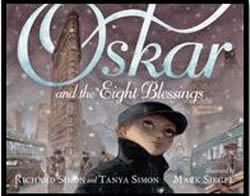Oskar and the Eight Blessings by Richard Simon and Tanya Simon, illustrated by Marc Siegel, Roaring Brook Press of MacMillan Children’s Publishing Group; ISBN 978-1-59643-949-8; 40 pages; $17.99.
By Donald H. Harrison

 SAN DIEGO — Back in the early 1970.s, when I worked for the Associated Press in New York City, I was always fascinated by what would be ahead at the next corner. You’d never know. A famous person. An interesting restaurant. A panhandler. There was an excitement and a vibrancy to New York City that made each day or night, in the city an adventure.
SAN DIEGO — Back in the early 1970.s, when I worked for the Associated Press in New York City, I was always fascinated by what would be ahead at the next corner. You’d never know. A famous person. An interesting restaurant. A panhandler. There was an excitement and a vibrancy to New York City that made each day or night, in the city an adventure.
The husband and wife team of Richard and Tanya Simon capture that feeling in Oskar and the Eight Blessings, while also sharing with the book’s intended juvenile readers a little bit of American history. Even more important, the book teaches that it’s important to keep one’s spirits up, or as young Oskar’s father told him before sending him by ship to the safety of the U.S. after the horror of Kristallnacht, “to look for the blessings.”
After arriving in December 1938 in New York City by ship, Oskar encounters not one, but eight, blessings as he walks 103 blocks from the Battery to the uptown apartment of his Aunt Esther, whom he has never met. Illustrator Mark Siegel helps us understand how cold it is on this walk as puffs of frozen breath emerge from Oskar’s mouth, and he rubs his ungloved hands, and blows on them to keep them warm. As Oskar’s walk progresses, we see many of the sights and sites of pre World War II New York City.
There is a strong subtext in this book that American Christians are a warm, welcoming, generous people. As young Oskar makes his way up Broadway, a woman feeding pigeons at Trinity Church, realizes how hungry he is and gives him some fresh bread. At Union Square, Oskar sees and wonders over a Superman comic book which he has no money to buy. The new stand man gives it to him, wishing him a Merry Christmas. At Macy’s window he stops in awe at the display of angels, and snowmen, elves and reindeer. At Carnegie Hall, a whistling musician, whom Oskar doesn’t recognize as Count Basie, whistles a tune, which Oskar whistles back–his first “conversation” in America. At Central Park, he catches a boy who slips in the snow, and they trade–the boy gives Oskar his gloves in exchange for the Superman comic book. A bit farther, and Oskar is told by a policeman to “stand back” to make room for the lady who is about to cross the sidewalk to a waiting car. But the lady chides the policeman that Oskar is no danger, but only a little boy. The lady is Eleanor Roosevelt on a visit from Washington D.C. Wanting to arrive at his aunt’s home in time to light the Chanukah candles, Oskar begins to run and falls down, but a man selling Christmas trees from a makeshift lot picks him up and puts him back on his path.
“His father was right,” Oskar thinks. “People can be good.” And after living in Nazi Germany this indeed is a revelation for him.
At last he reaches his aunt’s address and hears a woman whistling a Yiddish melody. Starting at the sight of him, the woman calls out the name of her little brother. No, Oskar explains, Benjamin is his father, “I’m”– but he can’t finish the sentence before the woman gathers him up into a hug, and finishes the sentence for him, “Oskar!” And though the script doesn’t say so, we are given to understand that Oskar had arrived in time for the lighting of the Chanukah candles.
In an author’s note, Richard Simon quotes Holocaust survivor Victor Frankl: “Everything can be taken from a man but one thing: the last of human freedoms–to choose one’s attitude in any given set of circumstances, to choose one’s own way.” Oskar, in his new world, looks for–and finds–the blessings.
*
Harrison is editor of San Diego Jewish World. You may comment to him at donald.harrison@sdjewishworld.com